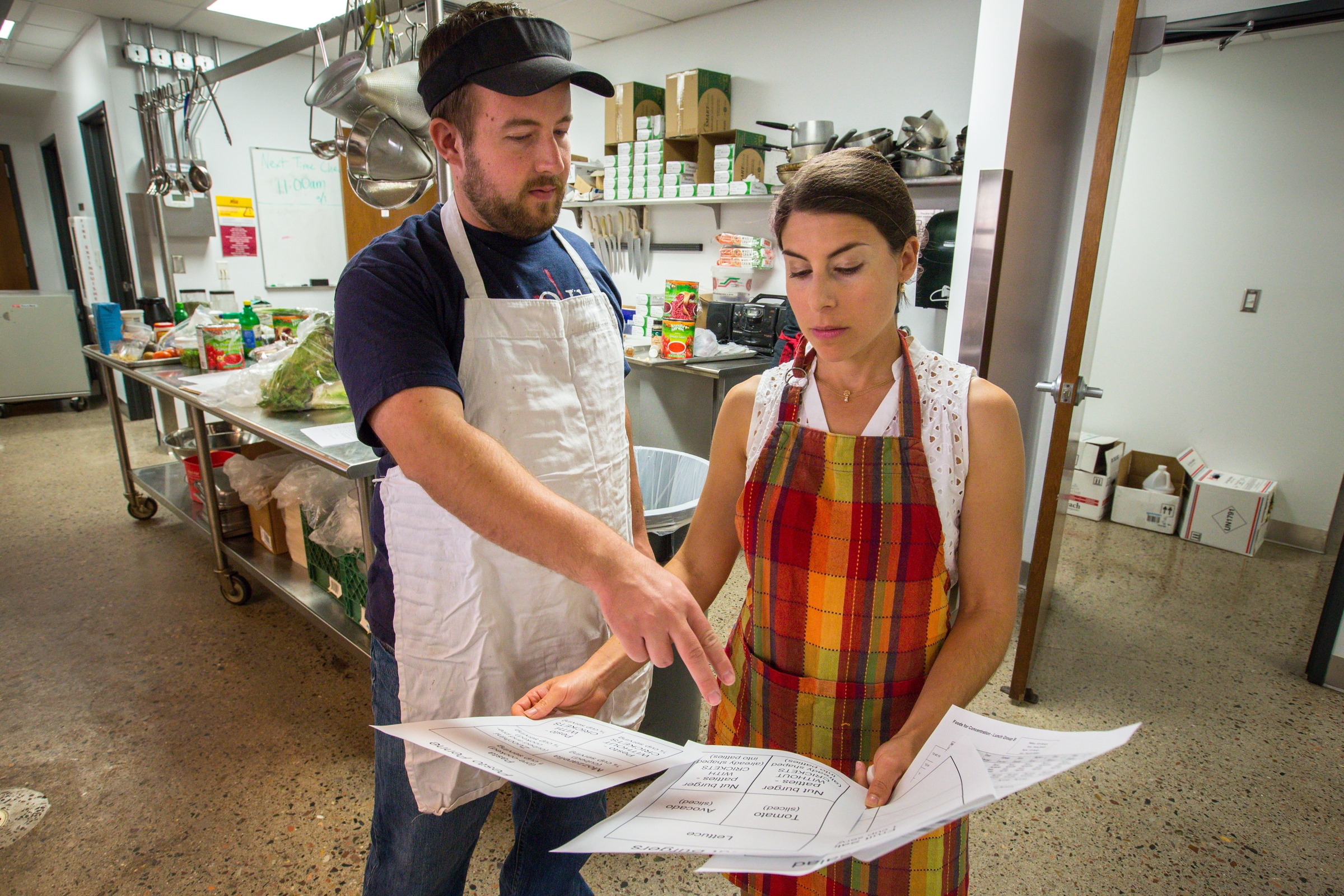Crickets.
It's what you might hear when you offer an insect entree, but it's also what will be on the menu April 12 at the ASU Kitchen Cafe on the Downtown Phoenix campus.
Customers on that day won’t be eating plates of whole crickets. Instead, they’ll have a choice if they want a powder containing the remnants of the insect sprinkled on their meal — or not.
“They’ll be ground up so it doesn’t look like you’re eating them … but it’s still a cricket,” said Heidi Lynch with a laugh.
Lynch is a registered dietitian who teaches Management of Food Service Systems (NTR 445), a lab for students in the School of Nutrition and Health PromotionThe School of Nutrition and Health Promotion is part of the College of Health Solutions. who are majoring in either dietetics or food service management. For their capstone project, students were assigned to groups of four and came up with their own theme and recipes for their production day next week, when their menu would be on offer for a day.
“This is not a culinary class or school, and while students will be preparing food, I’ll also be looking at how they manage each other, production schedules, food safety, purchase orders and menus,” Lynch said. “They’ll be putting what they’ve learned all semester long into practice.”
The groups have prepared menus that promote healthy eating, focusing specifically on antioxidants, diabetes, digestion, heart and energy.
One team — Anna Gianpetro, Rachel Pfeifer, Melissa Galloway and Jared Blake — prepared a menu that promoted brain concentration. They came up with a clever low-calorie, high-protein menu of a Neuro-Nut Burger, Perceptive Pesto Penne, Mind-Muffin and Focusing Fruit Salad.
But how did Gianpetro come of with the idea of adding cricket powder to the first two menu items?
ASU nutrition/dietetics students Jared Blake and Anna Gianpetro (also pictured in the top photo) go over ingredients for a low-sodium, diabetic-friendly Tuscan vegetable soup at the ASU Kitchen Cafe on April 5. Their team’s menu April 12 will feature antioxidant-rich foods for concentration, with the option of adding powdered cricket protein. Photos by Charlie Leight/ASU Now
“I had been listening to a Gastropod episode called Night of the Living Radishes where they describe eating grasshoppers in Mexico,” said Gianpetro, a 36-year-old dietetics and nutrition senior in the College of Health Solutions. “After their experience, they liked the flavor enough to incorporate cricket flour into recipes and spoke about the sustainability of the product. I’m a firm believer in sourcing low-impact, responsibly raised and slaughtered protein, and that’s where crickets fit the bill.”
Crickets also fit the bill nutritionally speaking. They are considered a sustainable and environmentally sound protein, loaded with potassium, calcium, iron, vitamin B and brain-building omega-3 fatty acids, monounsaturated fats and antioxidants.
Beyond all the nutritional and health benefits of crickets, it’s also a good idea to give natural protein such as beef a break, said Pfiefer, a 28-year-old dietetics and nutrition senior who will graduate in December.
“Eating a lot of beef can develop and bring up a lot of bacteria in your body,” Pfiefer said. “That could translate into inflammation, and eating less is healthier for you.”
The problem, of course, is that many Westerners consider eating insects disgusting. But according to Gianpetro, it’s as tasty as the dickens.
“It’s got a salty-nutty taste, and the flavor is quite savory,” Gianpetro said. “It doesn’t work with everything, but it should be considered a spice or seasoning.”
ASU nutrition/dietetics students Rachel Pfeifer and Jared Blake peel onions at the ASU Kitchen Cafe on April 5. NTR 445: Management of Food Service Systems is a lab for students in the School of Nutrition and Health Promotion who are majoring in either dietetics or food service management, and the goals are learning to manage production schedules, food safety, purchase orders and menus.
Gianpetro hopes cricket protein powder will catch on with foodies in the States. It has been used in such items as protein bars, milkshakes and brownie mix.
But even she readily admits she can only stomach the critters if they’re dead and have gone through the milling process.
“They’re cute, but I don’t like the idea of them jumping around my legs,” Gianpetro said, laughing.
If you go
What: “Foods for Concentration” special menu featuring two items with optional cricket powder at the ASU Kitchen Cafe, which is open to the public.
When: 11:40 a.m.-12:50 p.m. Tuesday, April 12.
Where: ASU Kitchen Cafe, on the ground floor of the Health South Building, 500 N. 3rd St. on the Downtown Phoenix campus.
Cost: Two menu items will have the cricket option: Neuro-Nut Burgers (walnuts, oats, lettuce, tomato, avocado, whole-wheat bun) are $4 each, and Perceptive Pesto Penne (whole-wheat penne, pesto, zucchini, cherry tomatoes and mozzarella) is $6. Other menu items range from $1 to $3.50.
More Health and medicine

ASU researchers discover new digestive process for medication
“Detoxification” is a word most of us have heard, usually in the context of shakes or supplements. But what does it actually mean? In our bodies, it is the natural, or medicinally assisted, removal…

ASU students produce winning video showing dangers of fentanyl use
The message appears one second into the 26-second video: “Fentanyl is 50x stronger than heroin.”The wording is in white, except for “50x” which is bright red.Then, immediately, another message: “…

ASU expands health care services to employees
You’re an Arizona State University employee, you’re nursing some sort of infection that just won’t go away, but your doctor’s office doesn’t have an available appointment for at least a week.What do…


